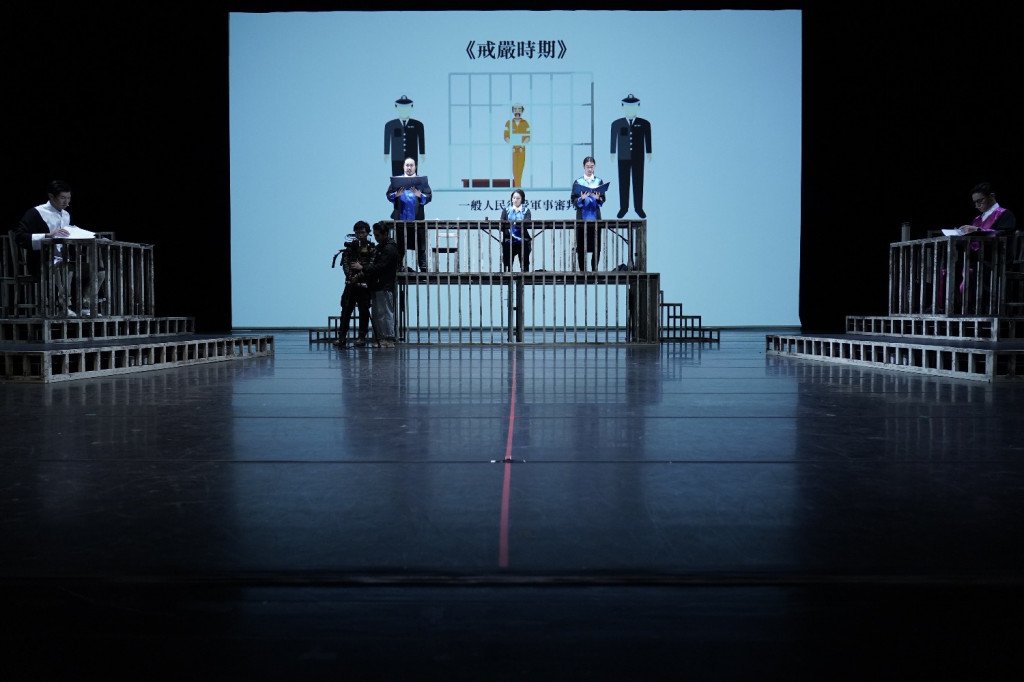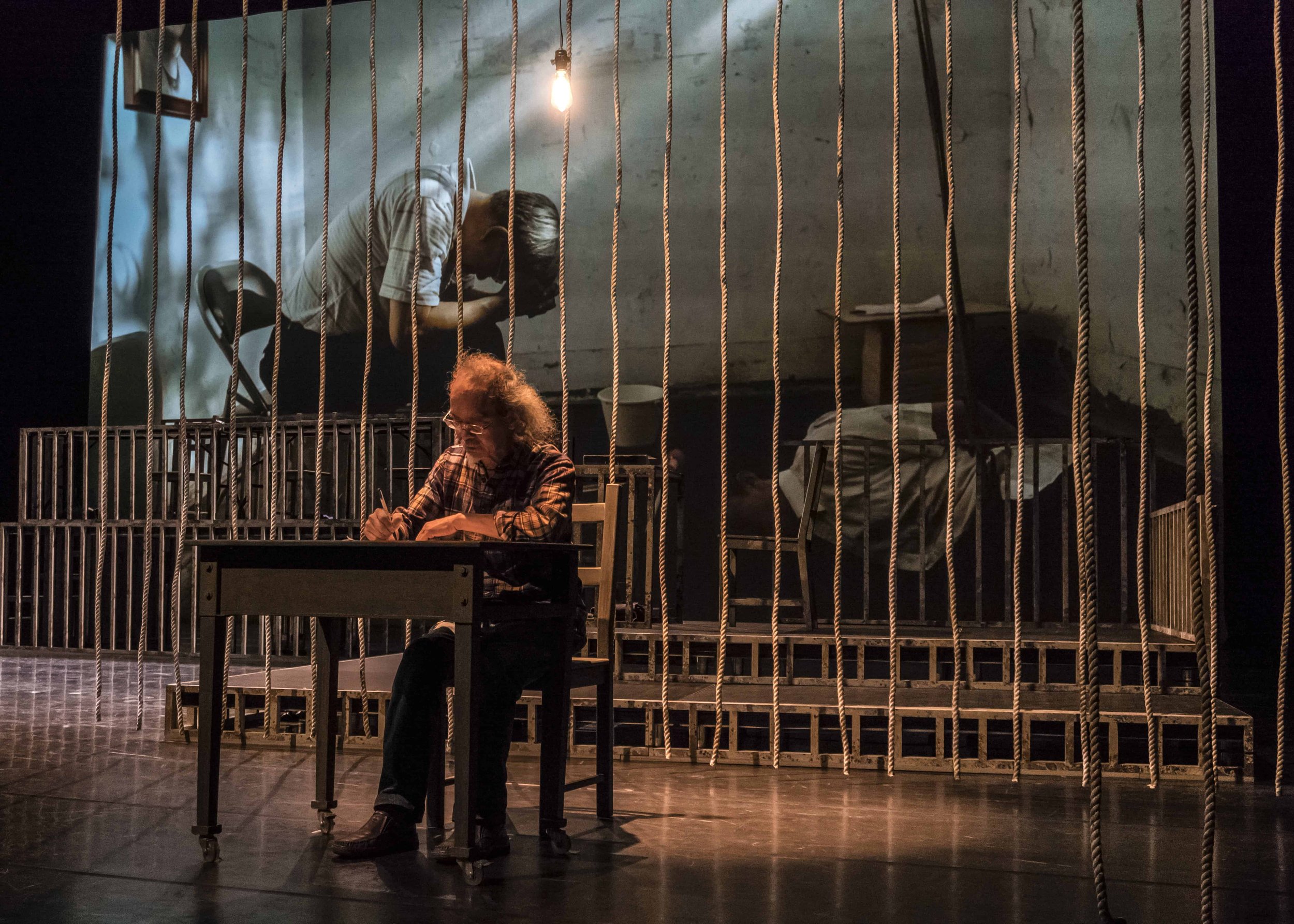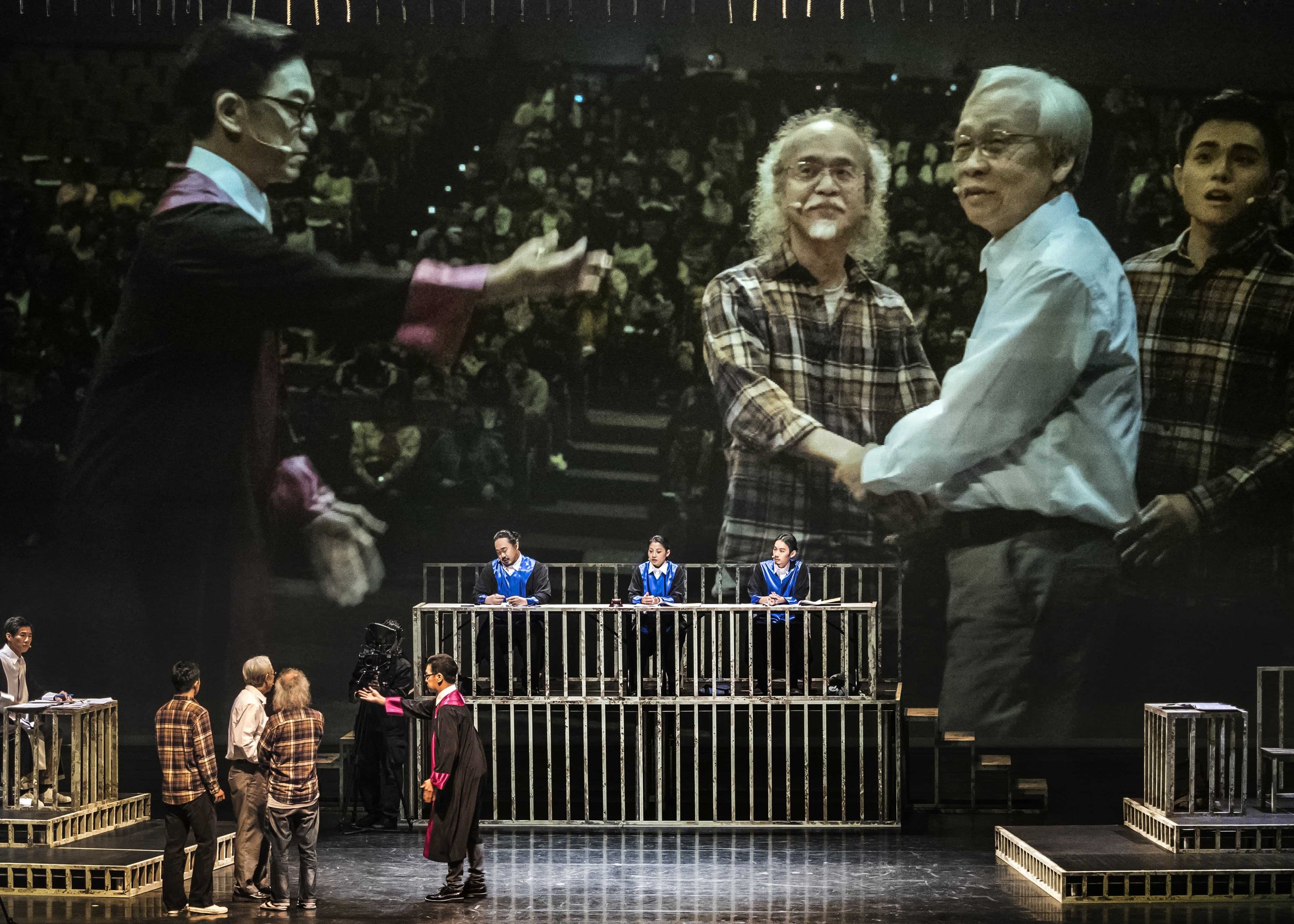Extraordinary Appeal Staged at the National Theatre
In Extraordinary Appeal, real-life political victims stand before us to recount their life stories and, surprisingly, express the hope of a better future for the nation despite the pains they’ve suffered — both mentally and physically — during Taiwan’s White Terror Period.
Performance: Extraordinary Appeal
Genre: Documentary theatre
Worth the journey: ★★★☆☆
Qin-Sheng Chen (left) recalls the different ways in which he was tortured when convicted as a political crime. Image courtesy of Fantasy Theatre
TAIPEI, Taiwan — The moment you walk into the National Theatre, you’ve entered a Supreme Court that requires you, alongside the rest of the audience, to be part of the national jury who will render a verdict for an extraordinary appeal.
According to Taiwan’s Supreme Prosecutors Office, extraordinary appeal is a legal remedy established with an aim to “obtain a conclusive criminal judgement or an arbitral award, which has substantially the same effect as a sentence of inflicting punishment.”
In Taiwan, extraordinary appeal is established in part 6 of the Code of Criminal Procedure. Designed for the benefit of the defendant, the petition for an extraordinary appeal is only accepted when the conclusive judgement is identified to be against the laws, thereby correcting judicial errors or wrongful convictions. However, not everyone can petition for an extraordinary appeal — only the Prosecutor General of the Supreme Prosecutors Office has the authority to do so.
Fantasy Theatre’s production, Extraordinary Appeal, shed light on this lesser-known relief litigation procedure, and examines a part of history that remains largely untouched, or even silenced, in Taiwan.
Referred to as “documentary theatre”, Extraordinary Appeal revolves around two defendants, namely Qin-Sheng Chen and Bi-Chuan Yang, both of whom were political victims during White Terror.
White Terror in Taiwan began when martial law was declared in 1949 and ended in 1992 — a period when Taiwanese civilians suffered controversial repression under the Kuomintang-ruled government.
Qin-Sheng Chen, a Malaysian student who came to study in Taiwan, was convicted for involving in the bombing of USIS Tainan in 1971, whereas Bi-Chuan Yang, a political dissident who was arrested due to his intention to overthrow the government, was sent to jail before he could finish high school.
The stage is not where these two men first met; their first encounter could be traced to more than 40 years ago when they were being sent, by boat, to serve their sentence at Green Island in Taitung County - the place has now become the Green Island White Terror Memorial Park. Like many other White Terror victims, Chen and Yang were labeled as “anti-state” who posed risks to the state.
“I’ve always been looking for opportunities to restore justice… this performance allows me to express my thoughts, and let everyone understand what I’ve suffered back then. I didn’t do anything wrong, yet I was sentenced to jail for a crime I did not commit,” Chen said in an interview.
Extraordinary Appeal begins by briefing legal procedures during the time when Martial Law was in practice, setting up the context for this fictional Supreme Court. Image courtesy of Fantasy Theatre
Bi-Chuan Yang presents himself in front of the judges at the Supreme Court in Extraordinary Appeal. Audience gets to see Yang’s facial expression close-up, which is projected on the back screen as he speaks. Image courtesy of Fantasy Theatre
When in jail, Bi-Chuan Yang writes his letter. Image courtesy of Fantasy Theatre
From the very start, judge of the fictional Supreme Court briefs the audience on the background of Martial Law, and how legal proceedings of that time may have infringed on human rights.
Due to the amount of legal terms mentioned throughout the play, audience without prior knowledge like myself need to pay extra attention to every words spoken. The amount of focus required is intense, knowing that if I spaced out even for a few seconds, it’d be difficult to catch up what I’ve missed.
Extraordinary Appeal provides a place where dialogues are created and exchanged between the defendants, their legal representative, lawyers, attorney general, and the judge. Their conversation urge spectators to reflect on the legitimacy of the state during a period of horror that’s been largely downplayed, all the while knowing that this debate happening before us is one that will never take place in reality.
According to the playwright Wan-Ting Shen, the rightfulness of individual action isn’t the centre of the discussion. Instead, we have to think if the state has the legitimate reasons to exercise its power and prosecute against basic rights like what the Taiwanese government had done to White Terror victims such as Qin-Sheng Chen and Bi-Chuan Yang.
Legitimacy of the state during the period of Martial Law in Taiwan lies at the heart of this heated debate and we, as national jury, have to make our vote. I have to admit that what really got me to come and see this performance wasn’t so much the history, but that I was curious about its voting process.
The voting was very much like a referendum where we’re asked to put our ballot into either the YES or NO box. The big question was: Do you agree or disagree that the state was unlawful between 1949 and 1987 when Martial Law was imposed?
In order to make sure that there’s ample time for audience to queue and make their vote, the intermission lasted up to 30 minutes. The voting result was announced by the judge after the intermission, in the presence of remaining court attendees. On that day, the voting percentage was nearly 80%: 379 voted YES, and 101 voted NO. Even though it’s fictional, I couldn’t help but wonder how the defendants feel before the result comes out.
During the intermission, people queue outside one of the two voting booths found on the 2F of National Theatre in Taipei.
On the ballot, the question reads “The state was unlawful between 1949 and 1987 when Martial Law was imposed?”. Please submit your ballot into the box “AGREE” or “DISAGREE”.
When asked if there’s any special meaning to them by taking part in this performance, Bi-Chuan Yang simply says: “The fact that we’re here onstage at the National Theatre is the biggest irony for that period.” Indeed, the National Theatre lies in the complex of National Chiang Kai-shek Memorial Hall, which serves as one of the nation’s most important power symbol. Interestingly, it is in this place of far-reaching importance where a debate on the deconstruction of power takes place.
The fact that this play is staged at the National Theatre — 3 years after the show’s premiere at the 2019 Taoyuan Iron Rose Festival — leaves Wan-Ting Shen with mixed feelings. "Theatre is a place of experimentation for the society…. but the fact that this play is being restaged today means that the same issue persists in our society,” Shen writes.
Today, Qin-Sheng Chen and Bi-Chuan Yang, both in their early 70s, refuse to be exonerated. As a political dissident, Yang sees such acceptance as a denial of himself being an activist. “I don’t need to be exonerated, because I intend to overthrow the state,” exclaims Yang onstage, an honest remark that is certainly no acting. On the other hand, Qin-Sheng Chen — having been prosecuted for a crime he did not commit — question: If I’m innocent to start with, then what’s there to exonerate from?
Bi-Chuan Yang and Qin-Sheng Chen are seen holding on to each other’s hands before the judges. Image courtesy of Fantasy Theatre
Looking back, I’ve been too naive to think that there’s this insurmountable distance between ordinary citizen and state power until Extraordinary Appeal presents us with real-life political victims who, standing in front of us, recount their life stories and, surprisingly, express the hope of a better future for the nation despite the pains they’ve suffered — both mentally and physically — during Taiwan’s White Terror Period.
If you walk into the theatre and expect Extraordinary Appeal to entertain you like other performances do, you would be disappointed by what you see. But if you come with an open heart, you’ll discover ideas and thoughts that, though being highly relevant to each and everyone of us, have been left out neglected by mainstream conversation.
You’ll come to realise how a nation’s transition to democracy is often made at the expense of justice, and that you don’t always get to hear the real side of the story.
Featured in the 2022 Artquake In Autumn program, Fantasy Theatre’s Extraordinary Appeal was staged at the National Theatre in Taipei on November 11-13, 2022.







